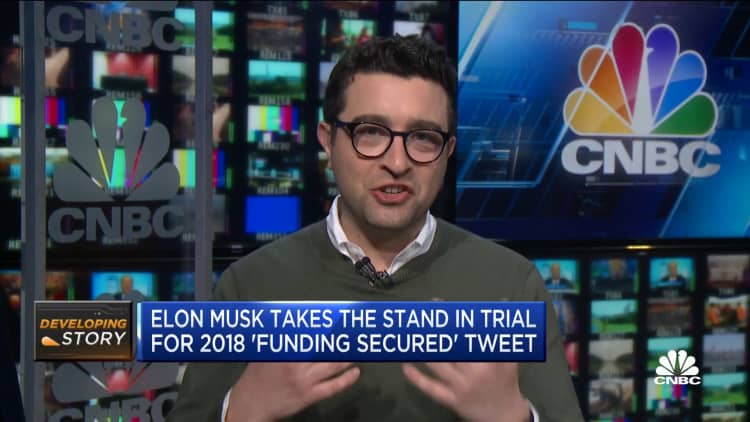[ad_1]
Alex Spiro, attorney to Elon Musk, center, departs court in San Francisco, California, US, on Tuesday, Jan. 17, 2023.
Benjamin Fanjoy | Bloomberg | Getty Images
Tesla CEO Elon Musk appeared in a San Francisco federal court on Friday to defend tweets he posted to his tens of millions of followers in August 2018.
The tweets said he had “funding secured” to take his electric vehicle company private for $420 per share, and that “investor support” for such a deal was “confirmed.”
Tesla’s stock trading initially halted after the tweets, then shares were highly volatile for weeks. Musk later said that he had been in discussions with Saudi Arabia’s sovereign wealth fund and felt sure that funding would come through at his proposed price. A deal never materialized.
The SEC charged Musk and Tesla with civil securities fraud after the tweets. Musk and Tesla each paid $20 million fines to the agency, and struck a revised settlement agreement that required Musk to temporarily relinquish his role as chairman of the board at Tesla.
His 2018 tweets also triggered a shareholder class action lawsuit from Tesla investors. They alleged that Musk’s tweets misled them and said relying on his statements to make trades cost them significant amounts of money.
The shareholders’ trades in question took place during a 10-day period before Musk seemed to admit a take-private deal was not going to happen in 2018.
Musk said under oath on Friday that it’s difficult to link Tesla’s stock price to his tweets.
“There have been many cases where I thought that if I were to tweet something, the stock price would go down,” Musk said. “For example, at one point I tweeted that I thought that, in my opinion, the stock price was too high…and it went went higher, which was, which is, you know, counterintuitive.”
A big increase in trading volume after he tweeted
It’s rare for top executives at publicly traded companies to discuss their stock price because any commentary can influence price movements.
Daniel Taylor, director of the Wharton Forensics Analytics Lab and professor at the University of Pennsylvania, analyzed every trade in Tesla stock occurring on Aug. 7, 2018, the day that Musk tweeted. He calculated the total trading volume every minute from the time the market opened through the time of Musk’s tweets about a buyout.
Taylor found that the trading volume the minute Musk tweeted, at 12:48 p.m. ET that day, was over $350 million, and the trading volume for Tesla shares the next minute was over $250 million. By comparison, the average volume five minutes before Musk tweeted was $32 million per minute. The minute before Musk tweeted, trading volume was $24 million.
“It is generally true that correlation is not causation,” Taylor told CNBC on Friday, after Musk’s first day on the witness stand. “However, I am unaware of any alternative explanation for a 10-fold increase in trading volume the same minute that Elon Musk tweeted.”
Musk also testified about his low opinion of short sellers on Friday.
“I believe short selling should be made illegal,” Musk said, referring to short sellers as “bad people on Wall Street” who “steal” from other investors. He said they also plant stories in the media to “get the stock to go down” and will “do anything in their power to make a company die.”
Tesla was among the most heavily shorted stocks in August 2018, when Musk made the statements about taking Tesla private. Tesla’s share price surged about 10% during trading that day. Short sellers face enormous losses when shares in a given company climb higher.
Some of the plaintiffs in the trial that’s underway claim that Musk’s “funding secured” tweets were intended to put upward price pressure on Tesla’s stock driving a so-called “short squeeze.”
Musk’s testimony is not yet complete and the court plans to hear from him again on Monday.
WATCH: Musk testifies over tweets

[ad_2]
Source link
